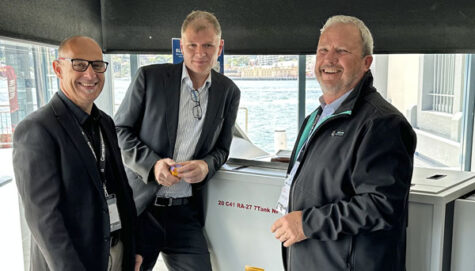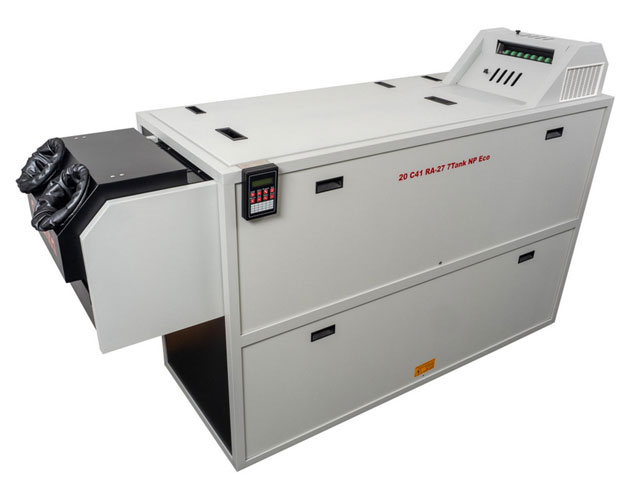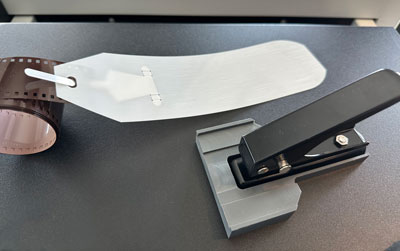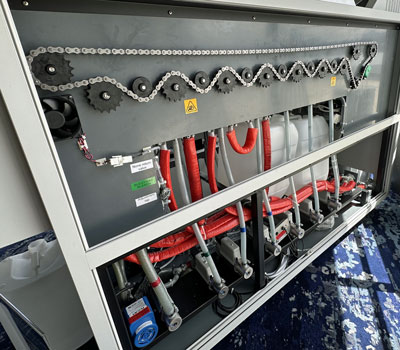Film-based photography has been hit hard on several fronts over the last 12 months, but recent developments would give enthusiasts and supporting retailers reasons to be more cheerful about its future.
The most publicised issue has been a lack of colour negative film, and patchy availability of Kodak branded film processing chemicals. More fundamentally, the withdrawal of film processing manufacturers like Noritsu and Fujifim from the market has threatened the entire retail AgX ecosystem with extinction.

Alexander Nowak, owner and managing director of Austrian-based Colenta Labortechnik was invited by his Australian distributor, Independent Photographic Supplies (IPS) to visit Australia last month to attend the Camera House AGM and trade show, reassuring local photo retailers that his company was there to fill the breach with a new generation of C41RA roller transport film processors.
Alex noted that the scarcity of colour film has been addressed to some extent over the last six months as Kodak ramps up production. While Kodak processing chemicals remain an issue for manufacturer Sino Promise, with China beefing up its dangerous goods (DG) regulations, (IPS) has a strong supply chain in place for a new generation of single part photochemistry from CPAC/Champion – which don’t attract DG restrictions.
‘We don’t have any control of film or chemistry supply, but with Colenta there is a new film processor option, and we intend to be the last man standing in this industry,’ he told Inside imaging.
As mentioned, Noritsu hasn’t manufactured a new ‘minilab’ film processor for over 10 years under its brand or Fujifilm’s. Many of the photo labs persevering with film processing – ironically a reasonably high margin segment – are doing so with old bangers from Noritsu, Fujifilm, Agfa and even Konica, held together with baling wire, duct tape and hope.

‘Outside of Colenta, there are no new film processors available in the world, full stop,’ said Stuart Holmes, managing director of Independent Photo. He added that Colenta also offers roller transport B&W variable speed film processors – its biggest seller to date – and even rotary transport E-6 slide film processors.
Colenta is celebrating its 60 anniversary this year. In its early days it was a pioneer in paper and film processing, manufacturing rotary type processors through to the 1980s. Alexander’s father purchased the business in 1990.
Rolling on
Manufacture of roller transport film and paper processors came next, and business was booming.
‘There was a huge market, and we sold hundreds of machines,’ he said. But then things came to a shuddering halt with the advent of digital cameras and a few years later inkjet printing, which combined as a body blow to the film and paper processing equipment manufacturers’ business model.
Rather than throw in the towel, Colenta sought new applications for its tried-and-true roller transport technology.
‘The decision was made to stick with the roller transport tech and to explore new opportunities and markets,’ explained Alexander. Medical X-ray film was first cab off the rank, and then Colenta moved into new niches such as processors for graphic arts film and printing plates.
Processors for industrial X-rays used in non-destructive monitoring and testing of plant and equipment was even further away from Colenta’s photographic industry roots. Then came the move in 2008 to manufacture roller transport processors for the manufacture of Printed Circuit Boards (PCBs) for the electronics/IT industries.
‘All this, together with the remaining business in photo film made Colenta a solid company while others, such as competitor Hostart Pro, wound down,’ Alexander explained. ‘We are now one of the last remaining companies manufacturing AgX roller transport processors for any segment.’
And so it was that, with a new generation of photographers rediscovering the qualities of silver halide technology ‘virtually out of the blue in 2019 we were overloaded with requests for processing machines – mainly colour paper.’
He concedes that for the prior 20 years or so photographic film and paper processors were ‘not exactly a hot item. We weren’t really prepared. We had to put together new designs, new chassis, pumps – everything had changed.
‘We went back to our roots with the aim to be last man standing, but with new designs and production methods.
‘The reason we are here today is that in the 90s we made that decision to explore new opportunities for roller transport tech.’
Over 120 people are employed throughout all the group divisions at two manufacturing plants in Austria and Germany. Colenta now offers over 70 models of roller transport, rotary and hanger systems across five separate industry segments. Alexander emphasised that it’s the whole of Colenta, the X-ray, graphic arts and PCB as well as photography that gives the business the economies of scale to prosper while competitors have fallen by the wayside.

Just manufacturing for the photo industry, even with the revival of interest in AgX, there probably wouldn’t be sufficient demand, but beyond Colenta’s hard-won expertise in roller transport technology, essential parts like pumps and solenoids are used in other machines as well.
‘Today we are doing about 250 wet processing machines a year. We can produce in small numbers economically, and that’s our secret.’
Colenta film processors are an integral part of the film emulsion coating lines at Kodak and Fujifim, film manufacturing plants providing quality control monitoring. There’s even a Colenta E6 film processor at the newly-revived Ektachrome coating line in Rochester, NY!
The Australian trip has been marked by success, with three new local Australian customers anticipating installation of their new film processor prior to Christmas.
‘IPS had a special offer for the Camera House AGM,’ explained Stuart. ‘The purchase price for the Colenta C-41RA film processor was bundled with enough free bonus CPAC/ Champion C-41 film chemistry to process the first 6000 rolls of colour film, sufficient to cover the Capex cost of the processor itself!’
With a throughput of 400-500 rolls per week, the processor will pay for itself in a matter of months, he added.
New take on ‘old’ technology
This ‘old’ technology is attracting a new generation of customers. ‘We are working with a new breed of photo lab people, typically around 25 years of age,’ said Alexander. ‘Most of the old film processors are gone – they stopped making them around the time these new people were born!’
But it’s a new take on roller transport technology. Colenta adopts a unique system of submerged non-opposed soft rubber rollers that ensure the safe transfer of film, (and paper and plates) through a series of chemical, washes and drying stages to produce consistent high quality images.
The transport modules are manufactured using non-corrosive long-life components and the staggered roller design with intermediate transfer stages allow materials to pass through without excessive pressure being applied. Having a submerged transport system eliminates dirt or crystallisation-related problems, and minimal daily maintenance is required.
Accurate automatic replenishment, temperature control and constant circulation ensures all processing parameters are maintained within pre-set programmable limits.

Colenta processors are also easier for operators and technicians to work with than the tightly designed minilab-style equipment of old. The processors are much more easy to service and more modular, with far less hard wiring of components. With a bit of training supported by IPS Technical Support Service, an in-house technician can replace the ‘plug & play’ pumps, heaters etc, and trouble-shoot most issues.
The new series of Colenta C-41RA Film Processors are available in either Washless or Wash Water versions. Washless ECO Film Stabiliser has been the industry standard in Australian film processing since the 1990s, noted Stuart Holmes.
So the future for film photography is beginning to look a little more rosy. There’s even rumours of a new colour film manufacturer emerging out of Europe to keep Kodak honest, and with Colenta picking up the opportunity offered as others vacate the film processor field, it’s upwards and onwards.
SPECIAL OFFER: For a short time only, Independent Photo is extending its special bonus bundle offer on Colenta film processors – enough free CPAC/ Champion C-41 film chemistry to process the first 6000 rolls of colour film – to Inside Imaging readers.
Contact sales@iphoto.net.au for more information.
Check out the Colenta colour and black& white film processor range here: https://www.iphoto.net.au/topic/IPS_B_colenta





Be First to Comment